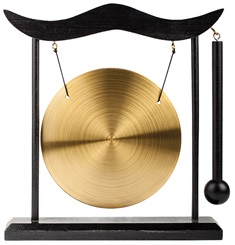Internal Medicine Meeting 2017 offers new, rapid-fire session
At Internal Medicine Meeting 2017, expect to hear recent research findings, clinical pearls and pitfalls, and maybe the sound of a gong.
At Internal Medicine Meeting 2017, expect to hear recent research findings, clinical pearls and pitfalls, and updates in subspecialty areas that are directly applicable to practice. But on Friday morning, don't be surprised if you also hear the sound of a gong.
New this year, a PechaKucha™ session will challenge five speakers each to present a clinically relevant topic in 6 minutes and 40 seconds. The PechaKucha™ format, which was developed in Tokyo and means “chit-chat” in Japanese, features 20 slides that automatically advance at 20-second intervals, so the speaker has no control over them, said Barbara Licht, Director of Educational Meetings and Conferences for ACP. “When the slides are over, the speaker is supposed to be done,” she said. “We've purchased a lovely gong, and if the speaker isn't done, boom.”

Because it takes two years to plan the meeting, there was a big focus on finding the right speakers to present fresh topics as part of the session, said Lisa Ellis, MD, FACP, Chair of the Internal Medicine Meeting 2017 Scientific Program Committee. “We tried to add in topics which might be missing from the program with fantastic speakers. Adult learners have a different way of engagement for learning. They frequently don't want to sit through long lectures … they want to come in and get what they need, and want to know what's hot and what's new,” she said.
The PechaKucha™ speakers will cover infectious disease, new ways of treating obesity, new insights on catatonia, how nuts can fight iron deficiencies, and emotional intelligence, said Dr. Ellis, associate professor at Virginia Commonwealth University (VCU) School of Medicine and chief medical officer of the Medical College of Virginia Physicians at VCU Medical Center in Richmond. “They're all speakers that I know very well, and they are top-notch, ‘home run’ speakers,” she said.
The Scientific Program runs from Thursday, March 30, through Saturday, April 1, with precourses on March 28 and 29, at the San Diego Convention Center. Keynote speaker Anthony S. Fauci, MD, MACP, director of the NIH's National Institute of Allergy and Infectious Diseases, will kick off the opening ceremony with a talk on emerging infectious diseases.
Last year's physician attendance at Internal Medicine Meeting 2016 in Washington, D.C., was more than 7,000, said Ms. Licht, who noted that the last meeting in San Diego was held in 2011. “So it's been quite a while since we've been there,” she said. “We're expecting a large turnout for what is a perennial favorite location among our membership.”
Attending medical conferences used to be about absorbing new clinical information, but now there are other, nonmedical factors to consider, Dr. Ellis said. “Now, it is also … all of the regulatory and EHR aspects, as well as the political and government aspects, that now are changing the face of how medicine is practiced,” she said. “And providers are struggling with their work-life balance: ‘How do I get through and continue to do this when it doesn't feel like medicine anymore?’”
So another new aspect this year is an increased focus on resiliency and the high level of physician burnout that is affecting retention, patient safety, professional satisfaction, and trainees' perceptions of the profession, said Dr. Ellis, who was also Chair of the 2015 Scientific Program Committee. While planning that meeting, the burden of burnout became increasingly apparent, she said. “ACP was realizing then that if we don't get on top of this, we're going to be really sunk,” she said. Multiple sessions will cover how physicians can take care of their own, mentor others, and increase resiliency, Dr. Ellis said. “We probably didn't address it at the same level” in past meetings, as it has now become a hot topic in headlines, she added.
A free precourse on opioid prescribing, which was new last year, returns again this year, Ms. Licht noted. And the hospital medicine precourse, which was not available at last year's meeting, is back this year by popular demand, she said.
Maintenance of Certification (MOC) points are available for precourses, and attendees can also earn 31 MOC points for the Scientific Program, Ms. Licht said. “Last year, over 1,000 participants earned MOC points at the meeting, so it is a popular feature,” she said. Attendees earn points by answering multiple-choice questions in online MOC modules, which are available for viewing ahead of time. “You can see what the possible responses are; you just can't answer it or see which is the right answer,” Ms. Licht said. “But … they're referenced to particular sessions at the meeting, so you would know where to go to learn the answer. You can use it as a way to preplan what you want to attend.”
Ms. Licht added that there is a change in ticketing for hands-on activities at the Herbert S. Waxman Clinical Skills Center. This year, attendees can reserve a spot in advance for $10 per activity, although first-come-first serve spaces will be free if available, she said.
Finally, attendees seeking the most up-to-date knowledge may find extemporaneous gems hidden in the meeting's closing session, which offers a recap of the highlights, Dr. Ellis noted. “There are always last-minute clinical pearls which are presented in the final highlight session,” she said.



